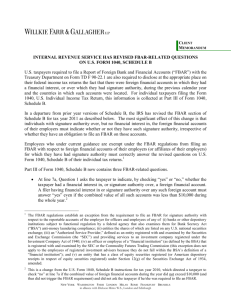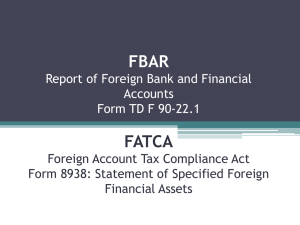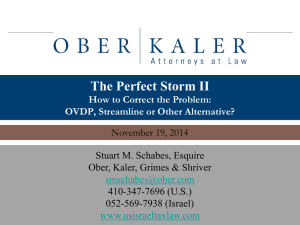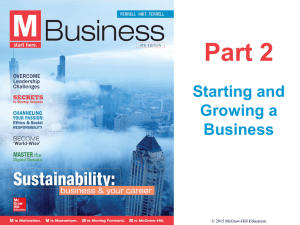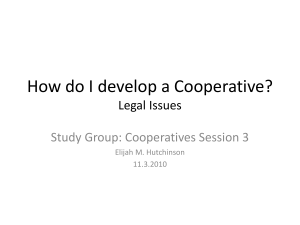An Introduction to International Tax Compliance
advertisement
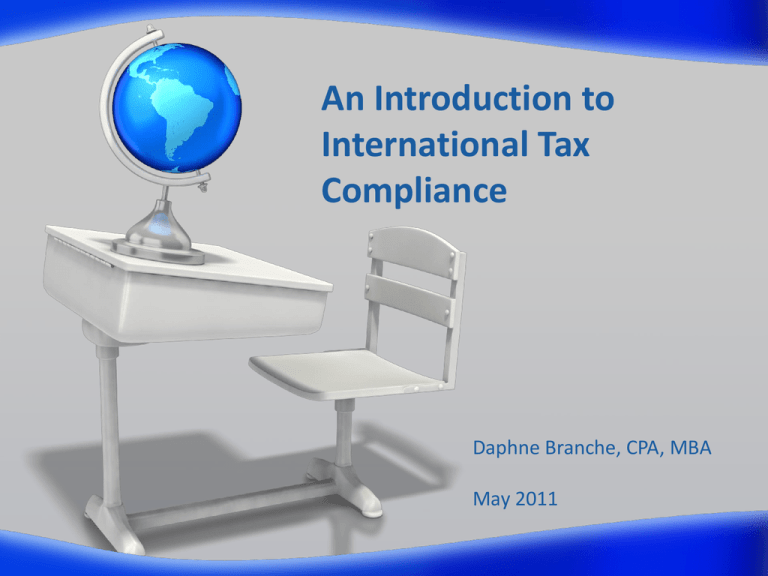
An Introduction to International Tax Compliance Daphne Branche, CPA, MBA May 2011 Agenda Topic Overview of International Tax Legal Entity Forms of Doing Business Abroad Data Gathering- What to File Tax Reporting Forms - Form 5471 - Form 8858 - Form 8865 - Form TD F 90-22.1 Questions & Answers Overview of International Tax Legal Entity Forms of Doing Business Abroad Entity Classifications Corporation Partnership Disregarded Entity Branch Hybrid Entity Reverse Hybrid Entity Data Gathering- What to File Financial Information • Income Statement • Balance Sheet • Detail of Intercompany transactions Including a description of the transaction, date & amount. Income Taxes Paid • Support for local taxes paid Examples: tax returns and tax receipts, Also include any support for foreign audit settlement Data Gathering- What to File Basis of Accounting • U.S. tax forms are filled out in accordance with U.S. tax accounting principles • Taxpayers must convert U.S. GAAP financial records to U.S. tax basis of accounting by making tax adjustments. Tax Reporting FormsForm 5471 Tax Reporting Forms Form 5471-Reporting by Foreign Corporations Overview • U.S. persons who are officers, directors, or shareholders in certain foreign corporations, use Form 5471 to satisfy the requirements of IRC §§6035, 6038, 6046, and related regulations. • Note: §6035 was repealed by the American Jobs Creation Act of 2004 (AJCA), effective for years beginning after December 31, 2004. Form 5471 is also a mechanism to report financial statement information and earnings and profits of foreign corporations. Tax Reporting Forms Form 5471-Reporting by Foreign Corporations Purpose • Reports financial statement information of foreign corporations including: • Discloses unexpected U.S. income items that need to be reported on the parent’s U.S. income tax return, but that are not in book income: • Income Statement & Balance Sheet, Income Taxes Paid or Accrued, Earnings and Profits, and Related Party Transactions Dividend income, Subpart F income, §956 inclusions, and Exchange gains/losses on distributions of previously taxed income. Can highlight potential IRS audit issues: “Transfer pricing" review looks at whether related party charges and costs do not accurately reflect U.S. income to parent corporation. Tax Reporting Forms Form 5471-Reporting by Foreign Corporations When and Where to File • When: • By the due date of the U.S. shareholder’s federal tax return. Where: • With the U.S. shareholder’s return ONLY. If U.S. shareholder’s return must be eFiled, the Form 5471s must be included in the XML file transmitted to the IRS. Tax Reporting Forms Form 5471-Reporting by Foreign Corporations Who Must File • • Category 1: Officer, director, or 10% shareholder of a foreign personal holding company (FPHC). Repealed with the American Jobs Creation Act of 2004 (AJCA). o No longer applicable. o FPHC provisions were repealed also. Category 2: U.S. citizen or resident who is an officer or director of a foreign corporation in which a U.S. person (defined below) has acquired (in one or more transactions): Stock which meets the 10% stock ownership requirement, or An additional 10% of the outstanding stock of the foreign corporation. Tax Reporting Forms Form 5471-Reporting by Foreign Corporations Who Must File, continued • Category 2: U.S. person includes: o U.S. citizen or resident, Domestic partnership, Domestic corporation, and/or Domestic estate or trust • Category 3: U.S. person who acquires 10% of foreign corporation stock. U.S. person who acquires enough foreign corporation stock which when added to existing stock owned meets the 10% ownership requirement threshold. Shareholder who becomes a U.S. person while meeting the 10% ownership requirement threshold. U.S. person who disposes of enough stock to fall below 10% threshold requirement. Tax Reporting Forms Form 5471-Reporting by Foreign Corporations Who Must File, continued • Category 4: • U.S. person who controls a foreign corporation for an uninterrupted period of at least 30 days during annual accounting period. • Control is defined as owning more than 50% of either: • • The total combined voting power, or • The total value of all shares of stock. A U.S. person who controls a foreign corporation that in turn owns more than 50% of the vote or value of another foreign corporation is deemed to be in control of the other foreign corporation as well. Tax Reporting Forms Form 5471-Reporting by Foreign Corporations Who Must File, continued • Category 5: • U.S. shareholder who owns stock in a foreign corporation that is a “CFC” (controlled foreign corporation) for an uninterrupted period of 30 days or more during the tax year and who owns stock on the last day of the tax year. U.S. Shareholder = U.S. person who owns 10% of voting stock. Tax Reporting Forms Form 5471-Reporting by Foreign Corporations Penalties for Noncompliance • • General: $10,000 per accounting period of each foreign corporation $10,000 per reportable transaction [Schedules N and O] $10,000 per 30 day period if not corrected within 90 days after IRS notice Maximum penalty is $50,000 for each failure. Foreign Tax Credit [§6038(c)]: 10% reduction in foreign tax credit (reduction of amount of foreign tax paid or deemed paid in the tax year) Additional 5% reduction per 3 month period if not corrected within 90 days after IRS notice Reduction for each failure limited to greater of • • • $10,000 or Income of the foreign business entity for the tax year. Criminal penalties under §§7203, 7206, 7207 Tax Reporting FormsForm 8858 Tax Reporting Forms Form 8858- Information Return of U.S. Persons With Respect to Foreign Disregarded Entities Overview • Used by certain U.S. persons that own a foreign disregarded entity (FDE) directly or, in certain circumstances, indirectly or constructively. • Satisfies the reporting requirements of §§6011, 6012, 6031 and 6038 and related regulations. • Effective for annual accounting period of the “tax owner” beginning on or after January 1, 2004, and for each applicable accounting period thereafter. • Note: The December 2007 version of Form 8858 does not have any substantial changes to it. Just remember to take note of the final regulations issued in 2007 for dual consolidated losses. Tax Reporting Forms Form 8858- Information Return of U.S. Persons With Respect to Foreign Disregarded Entities When and Where to File • • • For annual accounting periods beginning on or after January 1, 2004. The “filer” attaches Form 8858 to its income tax (i.e., Form 1120) or information return (i.e., Form 5471 or 8865). Where to attach a Form 8858 in the .XML file that is transmitted to the IRS will be communicated at a later date after guidance is released by the IRS. Tax Reporting Forms Form 8858- Information Return of U.S. Persons With Respect to Foreign Disregarded Entities Who Must File • U.S. persons that are “tax owners” of FDEs at any time during the U.S. person’s taxable year or annual accounting period. • U.S. persons include U.S. citizens and residents, domestic corporations, domestic partnerships and certain estates/trusts. • Includes U.S. persons that are required to file Form 5471 for a CFC that is a “tax owner” of an FDE at any time during the CFC’s annual accounting period. • Includes U.S. persons that are required to file Form 8865 for a CFP that is a “tax owner” of an FDE at any time during the CFP’s annual accounting period. Tax Reporting Forms Form 8858- Information Return of U.S. Persons With Respect to Foreign Disregarded Entities Who Must File, continued • Foreign branches and representative offices are not required to file Form 8858. • However, they may do so. • Note: A foreign branch/representative office of a U.S. corporation claiming a foreign tax credit must still disclose a separate income statement, balance sheet and list of remittances if Form 8858 is not filed. Tax Reporting Forms Form 8858- Information Return of U.S. Persons With Respect to Foreign Disregarded Entities Penalties for Noncompliance • • The “failure to file” penalties are the same as for CFCs and CFPs (i.e., $10,000 and up to 10% loss of foreign tax credits) under the §6038(a) rules Criminal penalties also apply under §§7203, 7206, and 7207. Tax Reporting FormsForm 8865 Tax Reporting Forms Form 8865 – Return of U.S. Persons With Respect to Certain Foreign Partnerships Overview • §6038 – Annual Reporting Requirements • Applicable for CFPs with tax years ending on or after December 31, 2000. • Filed with annual income tax return. • If no annual income tax return is due, Form 8865 is filed at the same time and place the annual income tax return would otherwise be due. • NO separate filing with the IRS office in Philadelphia, PA. Tax Reporting Forms Form 8865 – Return of U.S. Persons With Respect to Certain Foreign Partnerships Who Must File • Category 1 Filer: A “U.S. person” who “controlled” a foreign partnership at any time during the partnership’s tax year. Control is defined as ownership of more than 50% of the capital interest, profits interest or the deductions of losses of the partnership. • Category 2 filer: A “U.S. Person” who at any time during the tax year owned a 10% or greater interest in the foreign partnership while the partnership was controlled by U.S. persons owning at least a 10% interest. If the foreign partnership had a Category 1 filer at any time during the tax year, no person is considered to be a Category 2 filer. Tax Reporting Forms Form 8865 – Return of U.S. Persons With Respect to Certain Foreign Partnerships Who Must File, continued • Category 3 Filer: Under §6038B, the following transfers by a U.S. person trigger a Form 8865 filing requirement. o A U.S. person contributed property during that person’s tax year to a foreign partnership in exchange for an interest in the partnership. The U.S. person contributing the property must either: o Directly or constructively own a 10% interest in the capital, income, loss, or deductions of the foreign partnership immediately after the contribution, OR The value of the property contributed exceeds $100,000 when added to the value of any property contributed to the partnership by such U.S. person or any related person during the 12-month period ending on the date of transfer. A U.S. person that previously transferred appreciated property to the partnership and was required to report that transfer under §6038B, if the foreign partnership disposed of such property while the U.S. person remained a direct or indirect partner in the partnership. Tax Reporting Forms Form 8865 – Return of U.S. Persons With Respect to Certain Foreign Partnerships Who Must File, continued • Category 4 Filer: Under §6046A, the following events by a U.S. person trigger a Form 8865 filing requirement: o Acquisition of an interest in a foreign partnership if the U.S. person’s direct interest increases by 10 or if after the acquisition, the U.S. person holds a 10% or more interest. o Disposition of an interest in a foreign partnership if the U.S. person’s direct interest decreases by 10% or if after the disposition, the U.S. person’s interest drops below 10% (but only if it was greater than 10% before the disposition). o Any change in ownership (by a direct action of the U.S. person or other partners) which causes the U.S. person’s ownership interest to change by more than 10%, or which cause it to increase above 10% of the total, or to decrease below 10% of the total. Tax Reporting Forms Form 8865 – Return of U.S. Persons With Respect to Certain Foreign Partnerships Penalties for Noncompliance • Category 1 and 2 filers A $10,000 penalty is imposed for each tax year there is a failure to furnish the required information within the time prescribed. If the information is not filed within 90 days after the IRS mails notice, an additional $10,000 penalty (per partnership) will apply for each 30-day period during which the failure continues after the 90-day period has expired. The additional penalty shall not exceed $50,000. Failure to file could also result in a 10% reduction of the foreign taxes available for credit. Constructive owners exception and Multiple Category 1 filers exception does not prohibit the application of these penalties. Criminal penalties under §§7203, 7206, and 7207 may apply for failure to file or for filing false or fraudulent information. Tax Reporting Forms Form 8865 – Return of U.S. Persons With Respect to Certain Foreign Partnerships Penalties for Noncompliance, continued • Category 3 filers A person that fails to properly report a contribution to a foreign partnership is subject to a penalty equal to 10% of the FMV of the property contributed. o The penalty is subject to a $100,000 limit, unless the failure is due to intentional disregard. • In addition, the transferor must recognize gain on the contribution as if the contributed property had been sold for FMV. Category 4 filers A person that fails to report acquisitions, dispositions, and changes in foreign partnership interests is subject to a $10,000 penalty. If the failure continue for more than 90 days after the IRS mails notice, an additional $10,000 penalty will apply for each 30-day period during which the failure continues after the 90-day period has expired. The additional penalty shall not exceed $50,000. Tax Reporting FormsTD F 90-22.1 Tax Reporting Forms TD F 90-22.1 Report for Foreign Bank and Financial Accounts Who Must File • Any United States person with a financial interest in, or signature or other authority over, any foreign financial account if the aggregate value of all accounts exceeds $10,000 at any time during the calendar year is generally required to file Form TD F 90-22.1, Report of Foreign Bank and Financial Accounts (“FBAR”). • U.S. person defined: United States citizen or United States resident. Including: An alien residing in the United States. An entity (corporations, partnerships, limited liability companies, etc.) created or organized in the United States or under the laws of the United States, or a trust or estate formed under the laws of the United States. Tax Reporting Forms TD F 90-22.1 Report for Foreign Bank and Financial Accounts What is a Foreign Financial Account? • Foreign financial account defined: A financial account located outside of the United States. Includes: Bank accounts Securities accounts Insurance and annuity policies with a cash value Commodities or futures options Mutual or other pooled funds o • Available to the general public with a regular net asset value The location of an account, not the nationality of the financial institution with which the account is held, determines whether the account is in a foreign country. Tax Reporting Forms TD F 90-22.1 Report for Foreign Bank and Financial Accounts What is a Financial Interest? • Defined: The U.S. person is the owner of record or has legal title over the account, or the owner of record or holder of legal title over the account is: A person acting as agent, nominee, or attorney for the U.S. person, A corporation in which the U.S. person owns directly or indirectly more than 50% of the stock value or voting power A partnership in which the U.S. person owns an interest in more than 50% of the profits or capital A trust where the U.S. person (1) is the trust grantor and has an ownership interest for U.S. tax purposes, or (2) has a greater than 50% present beneficial interest in the assets or income of the trust, or (3) has established an appointed trust protector that is subject to the U.S. person’s direct or indirect instruction Any other entity in which the U.S. person owns directly or indirectly more than 50% of the voting power, total value of the equity interest or assets, or interest in profits Tax Reporting Forms TD F 90-22.1 Report for Foreign Bank and Financial Accounts What is Signature or Other Authority? • Signature or other authority defined: The authority of an individual (alone or in conjunction with another) to control the disposition of money, funds, or other assets held in a financial account by direct communication (whether in writing or otherwise) to the person with whom the financial account is maintained. Tax Reporting Forms TD F 90-22.1 Report for Foreign Bank and Financial Accounts Signature or Other Authority: Exceptions for Public Companies • An officer or employee with signature or other authority over, but no financial interest in, a foreign financial account of an entity with a class of equity securities, whether foreign or domestic, listed on any United States national securities exchange. An officer or employee of a U.S. subsidiary of a listed U.S. entity if the U.S. subsidiary is included in a consolidated FBAR report of the parent and the officer or employee has no financial interest in the subsidiary's financial account. Only applies with respect to foreign financial accounts directly owned by the entity that employs the officer or employee. Tax Reporting Forms TD F 90-22.1 Report for Foreign Bank and Financial Accounts Signature or Other Authority: Exceptions for Public Companies, cont. • These exceptions do not apply to: A U.S. officer or employee of a private company, who has signature authority over a foreign financial account of the private company or a domestic or foreign subsidiary of a private company A U.S. officer or employee of a controlled foreign corporation (“CFC”) that has signature authority over a CFC’s foreign financial account An officer or employee of a U.S. subsidiary who has signature authority over a U.S. parent’s foreign financial account An employee of a U.S. subsidiary with a foreign parent Tax Reporting Forms TD F 90-22.1 Report for Foreign Bank and Financial Accounts Signature or Other Authority: Other Exceptions • An officer or employee with signature or other authority over a foreign financial account of a U.S. corporation that has a class of equity securities registered under section 12(g) of the Securities Exchange Act and the officer or employee has no financial interest in the account • Any person with signature or other authority over, but no financial interest in, a foreign financial account and who is an officer or employee of: A bank that is examined by federal banking agencies, A financial institution that is registered with and examined by the Securities and Exchange Commission or Commodity Futures Trading Commission, or An Authorized Service Provider where there is an account owned or maintained by an investment company that is registered with the Securities and Exchange Commission Tax Reporting Forms TD F 90-22.1 Report for Foreign Bank and Financial Accounts Signature or Other Authority: Other Exceptions for Private companies, U.S. and foreign partnerships, foreign subsidiaries, etc. • There are no exceptions for employees and officers of private U.S. companies, U.S. and foreign partnerships, foreign subsidiaries, private foreign corporations, and subsidiaries of foreign corporations, who are U.S. citizens or residents and have signature or other authority over a foreign financial account of such an entity. Tax Reporting Forms TD F 90-22.1 Report for Foreign Bank and Financial Accounts Data Collect • Companies must: • Data collection: Identify all foreign accounts and gather all account information that needs to be reported. • Accounts include all bank and financial accounts of subsidiaries, disregarded entities, joint ventures and non-corporate accounts, related parties, pension plans, trusts, etc. Closed accounts Inactive accounts • Evaluate organization chart and any financial/banking account oversight controls • Inquiries to and collect information from legal entities, business units, treasury and accounting functions, etc. Tax Reporting Forms TD F 90-22.1 Report for Foreign Bank and Financial Accounts Data Collect: Required Information • Name of account owner • Taxpayer Identification Number of account owner (i.e., EIN or FIN) • Account holder’s mailing address • Type of foreign account (e.g., bank, securities) • Name of financial institution holding foreign account • Mailing address of financial institution holding foreign account • Account number (or equivalent designation) • Maximum value of account during the calendar year • Names of signature authorities • Designation of whether a U.S. person • Taxpayer Identification number of signatory (i.e., SSN or employee ID number) Tax Reporting Forms TD F 90-22.1 Report for Foreign Bank and Financial Accounts Recent Updates • An expanded FBAR rule effective March 28, 2011 impacts virtually all companies. Employees and officers having signature authority over one or more foreign financial accounts of the company must file a FBAR with respect to each account, unless one of the limited exceptions apply. An exception applies only with respect to foreign financial accounts directly owned by the entity that employs the officer or employee. • Compliance may require a substantial information gathering, analysis, and documentation effort. • Forms must be received by June 30, 2011. Tax Reporting Forms TD F 90-22.1 Report for Foreign Bank and Financial Accounts Filing Procedures • Timely filing procedures: Form TD F 90-22.1, Report of Foreign Bank and Financial Accounts, is completed on a calendar year basis Updated Form and Instructions issued March 2011 Must be received by June 30 of following year o • IRC §7502 mailbox rule does not apply Filed with Detroit Center Filing procedures for delinquent and prior year extended filings: Use current year form for all filings, do not use prior year forms Late filing statement if not extended by prior IRS guidance Filed with Detroit Center Tax Reporting Forms TD F 90-22.1 Report for Foreign Bank and Financial Accounts Filing Procedures • Timely filing procedures: Form TD F 90-22.1, Report of Foreign Bank and Financial Accounts, is completed on a calendar year basis Updated Form and Instructions issued March 2011 Must be received by June 30 of following year o • IRC §7502 mailbox rule does not apply Filed with Detroit Center Filing procedures for delinquent and prior year extended filings: Use current year form for all filings, do not use prior year forms Late filing statement if not extended by prior IRS guidance Filed with Detroit Center Tax Reporting Forms- Penalties TD F 90-22.1 Report for Foreign Bank and Financial Accounts Violation Civil penalties Criminal penalties Negligent violation Up to $500 N/A Non-willful violation Up to $10,000 for each negligent violation N/A Pattern of negligent activity In addition to penalty under §5321(a)(6)(A) with respect to any such violation, not more than $50,000 N/A Willful —Failure to file FBAR or retain records of account Up to the greater of $100,000, or 50 percent of the amount in the account at the time of the violation. Up to $250,000 or 5 years or both Willful —Failure to file FBAR or retain records of account while violating certain other laws Up to the greater of $100,000, or 50 percent of the amount in the account at the time of the violation. Up to $500,000 or 10 years or both Knowingly and willfully filing false FBAR Up to the greater of $100,000, or 50 percent of the amount in the account at the time of the violation. $10,000 or 5 years or both Tax Reporting Forms- Example 1 TD F 90-22.1 Report for Foreign Bank and Financial Accounts • Mark, a payroll supervisor and U.S. employee of USCo, a publicly traded U.S. corporation engaged in the manufacture of consumer electronics, had the ability to direct a foreign banking institution to transfer funds from a nonU.S. bank account (with funds in excess of $10,000) owned by ForCo., a wholly owned German subsidiary of USCo, to ForCo’s employees throughout the 2010 calendar year. Does Mark need to file a FBAR? Tax Reporting Forms- Example 2 TD F 90-22.1 Report for Foreign Bank and Financial Accounts • Same as example 1, except that the foreign bank account is owned by USCo, Mark’s employer, rather than ForCo. Does Mark need to file a FBAR with respect to USCo’s foreign bank account? Tax Reporting Forms- Example 3 TD F 90-22.1 Report for Foreign Bank and Financial Accounts • Same as example 1, except that Mark is a U.S. employee of OpCo, a wholly owned U.S. subsidiary of USCo. In addition, Sarah, who is the CFO of USCo and a U.S. employee, also has signature authority over ForCo’s foreign bank account. Who must file a FBAR? • Both Sarah and Mark must file a FBAR with respect to ForCo’s foreign bank account. • Mark’s employment by USCo’s subsidiary does not alter Mark’s requirement to file a FBAR with respect to ForCo’s foreign account. • Sarah has signature authority over a foreign subsidiary’s bank account and must file a FBAR with respect to ForCo’s foreign account. Tax Reporting Forms- Example 4 TD F 90-22.1 Report for Foreign Bank and Financial Accounts • Same as example 1, except that Mark retired in February of 2010, and ForCo had him removed as a person with signature authority at such time. Does Mark still need to file a FBAR? Tax Reporting Forms- Example 5 TD F 90-22.1 Report for Foreign Bank and Financial Accounts • In 2010, Kim, a procurement manager and U.S. citizen employed by US Inc., a publicly traded U.S. corporation engaged in the retail sale of consumer products, transferred to and became an employee of Foreign Supply Co. (FSC), a wholly-owned direct Chinese subsidiary of US, Inc., to oversee foreign product procurement. Kim was given signing authority over FSC’s non-U.S. bank accounts. In addition, Jill, US Inc.’s CFO who is a U.S. person, and Greg, a Chinese national and employee of FSC, also have signature authority over FSC’s foreign accounts. Who must file must file a FBAR with respect to FSC’s foreign accounts for 2010? Tax Reporting Forms- Example 6 TD F 90-22.1 Report for Foreign Bank and Financial Accounts • Rosa is a Mexican citizen who works for a wholly-owned Mexican subsidiary of a publicly traded U.S. corporation. As part of Rosa’s responsibilities, Rosa has signature authority over all of the Mexican subsidiary’s financial accounts in Mexico. In March 2010, Rosa moved to the U.S. as an employee of the Mexican subsidiary to work directly with her U.S counterparts at the U.S. parent. Rosa also continued to own her personal bank accounts in Mexico. Does Rosa need to file a FBAR for 2010? Would there be a different result if Rosa transferred and became an employee of the U.S. parent? Tax Reporting Forms- Example 7 TD F 90-22.1 Report for Foreign Bank and Financial Accounts • ForBank plc is a U.K. company listed on the FTSE and trades in ADRs in the U.S. Big Bank plc, through its U.K. and non-U.K. subsidiaries, is engaged in commercial banking activities, asset and wealth management activities, and proprietary investments. James, the CEO of ForBank plc resides in London but retains his U.S. citizenship. For all of 2010, James had signature authority over all of ForBank plc’s corporate banking and financial accounts, including U.K. and other non-U.S. financial accounts. In addition, the treasury function for all of ForBank plc’s non-U.K. operations are conducted by its wholly owned subsidiary, ForHoldco, a Swiss company. James also has signature authority over ForHoldco’s financial accounts. Does James need to file a FBAR? Tax Reporting Forms- Example 8 TD F 90-22.1 Report for Foreign Bank and Financial Accounts • George, a U.S. person, had the ability to direct a foreign banking institution to transfer funds from a non-U.S. bank account (with funds in excess of $10,000) of his employer during calendar years 2009 and 2010.In June of 2010, George elected not to file an FBAR for signature authority until the IRS issued more definitive guidance. Provided no exceptions apply, does George need to file a FBAR for 2009 and 2010? Questions?
